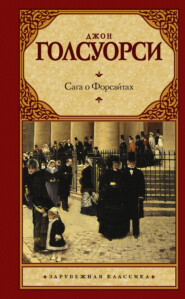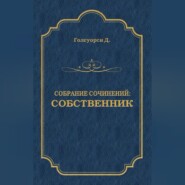По всем вопросам обращайтесь на: info@litportal.ru
(©) 2003-2025.
✖
Plays : Third Series
Настройки чтения
Размер шрифта
Высота строк
Поля
MORE. Poor Henry!
STEEL. It's partly nerves, of course—the windows have been broken twice—but it's partly–
MORE. Patriotism. Quite! they'll do the next smashing themselves. That reminds me—to-morrow you begin holiday, Steel.
STEEL. Oh, no!
MORE. My dear fellow—yes. Last night ended your sulphur cure. Truly sorry ever to have let you in for it.
STEEL. Some one must do the work. You're half dead as it is.
MORE. There's lots of kick in me.
STEEL. Give it up, sir. The odds are too great. It isn't worth it.
MORE. To fight to a finish; knowing you must be beaten—is anything better worth it?
STEEL. Well, then, I'm not going.
MORE. This is my private hell, Steel; you don't roast in it any longer. Believe me, it's a great comfort to hurt no one but yourself.
STEEL. I can't leave you, sir.
MORE. My dear boy, you're a brick—but we've got off by a miracle so far, and I can't have the responsibility of you any longer. Hand me over that correspondence about to-morrow's meeting.
STEEL takes some papers from his pocket, but does not hand them.
MORE. Come! [He stretches out his hand for the papers. As STEEL still draws back, he says more sharply] Give them to me, Steel! [STEEL hands them over] Now, that ends it, d'you see?
They stand looking at each other; then STEEL, very much upset, turns and goes out of the room. MORE, who has watched him with a sorry smile, puts the papers into a dispatch-case. As he is closing the bureau, the footman HENRY enters, announcing: "Mr. Mendip, sir." MENDIP comes in, and the FOOTMAN withdraws. MORE turns to his visitor, but does not hold out his hand.
MENDIP. [Taking MORE'S hand] Give me credit for a little philosophy, my friend. Mrs. More told me you'd be back to-day. Have you heard?
MORE. What?
MENDIP. There's been a victory.
MORE. Thank God!
MENDIP. Ah! So you actually are flesh and blood.
MORE. Yes!
MENDIP. Take off the martyr's shirt, Stephen. You're only flouting human nature.
MORE. So—even you defend the mob!
MENDIP. My dear fellow, you're up against the strongest common instinct in the world. What do you expect? That the man in the street should be a Quixote? That his love of country should express itself in philosophic altruism? What on earth do you expect? Men are very simple creatures; and Mob is just conglomerate essence of simple men.
MORE. Conglomerate excrescence. Mud of street and market-place gathered in a torrent—This blind howling "patriotism"—what each man feels in here? [He touches his breast] No!
MENDIP. You think men go beyond instinct—they don't. All they know is that something's hurting that image of themselves that they call country. They just feel something big and religious, and go it blind.
MORE. This used to be the country of free speech. It used to be the country where a man was expected to hold to his faith.
MENDIP. There are limits to human nature, Stephen.
MORE. Let no man stand to his guns in face of popular attack. Still your advice, is it?
MENDIP. My advice is: Get out of town at once. The torrent you speak of will be let loose the moment this news is out. Come, my dear fellow, don't stay here!
MORE. Thanks! I'll see that Katherine and Olive go.
MENDIP. Go with them! If your cause is lost, that's no reason why you should be.
MORE. There's the comfort of not running away. And—I want comfort.
MENDIP. This is bad, Stephen; bad, foolish—foolish. Well! I'm going to the House. This way?
MORE. Down the steps, and through the gate. Good-bye?
KATHERINE has come in followed by NURSE, hatted and cloaked, with a small bag in her hand. KATHERINE takes from the bureau a cheque which she hands to the NURSE. MORE comes in from the terrace.
MORE. You're wise to go, Nurse.
NURSE. You've treated my poor dear badly, sir. Where's your heart?
MORE. In full use.
NURSE. On those heathens. Don't your own hearth and home come first? Your wife, that was born in time of war, with her own father fighting, and her grandfather killed for his country. A bitter thing, to have the windows of her house broken, and be pointed at by the boys in the street.
[MORE stands silent under this attack, looking at his wife.]
KATHERINE. Nurse!
NURSE. It's unnatural, sir—what you're doing! To think more of those savages than of your own wife! Look at her! Did you ever see her look like that? Take care, sir, before it's too late!
MORE. Enough, please!
NURSE stands for a moment doubtful; looks long at KATHERINE; then goes.
MORE. [Quietly] There has been a victory.
[He goes out. KATHERINE is breathing fast, listening to the distant hum and stir rising in the street. She runs to the window as the footman, HENRY, entering, says: "Sir John Julian, Ma'am!" SIR JOHN comes in, a newspaper in his hand.]
KATHERINE. At last! A victory!
SIR JOHN. Thank God! [He hands her the paper.]
STEEL. It's partly nerves, of course—the windows have been broken twice—but it's partly–
MORE. Patriotism. Quite! they'll do the next smashing themselves. That reminds me—to-morrow you begin holiday, Steel.
STEEL. Oh, no!
MORE. My dear fellow—yes. Last night ended your sulphur cure. Truly sorry ever to have let you in for it.
STEEL. Some one must do the work. You're half dead as it is.
MORE. There's lots of kick in me.
STEEL. Give it up, sir. The odds are too great. It isn't worth it.
MORE. To fight to a finish; knowing you must be beaten—is anything better worth it?
STEEL. Well, then, I'm not going.
MORE. This is my private hell, Steel; you don't roast in it any longer. Believe me, it's a great comfort to hurt no one but yourself.
STEEL. I can't leave you, sir.
MORE. My dear boy, you're a brick—but we've got off by a miracle so far, and I can't have the responsibility of you any longer. Hand me over that correspondence about to-morrow's meeting.
STEEL takes some papers from his pocket, but does not hand them.
MORE. Come! [He stretches out his hand for the papers. As STEEL still draws back, he says more sharply] Give them to me, Steel! [STEEL hands them over] Now, that ends it, d'you see?
They stand looking at each other; then STEEL, very much upset, turns and goes out of the room. MORE, who has watched him with a sorry smile, puts the papers into a dispatch-case. As he is closing the bureau, the footman HENRY enters, announcing: "Mr. Mendip, sir." MENDIP comes in, and the FOOTMAN withdraws. MORE turns to his visitor, but does not hold out his hand.
MENDIP. [Taking MORE'S hand] Give me credit for a little philosophy, my friend. Mrs. More told me you'd be back to-day. Have you heard?
MORE. What?
MENDIP. There's been a victory.
MORE. Thank God!
MENDIP. Ah! So you actually are flesh and blood.
MORE. Yes!
MENDIP. Take off the martyr's shirt, Stephen. You're only flouting human nature.
MORE. So—even you defend the mob!
MENDIP. My dear fellow, you're up against the strongest common instinct in the world. What do you expect? That the man in the street should be a Quixote? That his love of country should express itself in philosophic altruism? What on earth do you expect? Men are very simple creatures; and Mob is just conglomerate essence of simple men.
MORE. Conglomerate excrescence. Mud of street and market-place gathered in a torrent—This blind howling "patriotism"—what each man feels in here? [He touches his breast] No!
MENDIP. You think men go beyond instinct—they don't. All they know is that something's hurting that image of themselves that they call country. They just feel something big and religious, and go it blind.
MORE. This used to be the country of free speech. It used to be the country where a man was expected to hold to his faith.
MENDIP. There are limits to human nature, Stephen.
MORE. Let no man stand to his guns in face of popular attack. Still your advice, is it?
MENDIP. My advice is: Get out of town at once. The torrent you speak of will be let loose the moment this news is out. Come, my dear fellow, don't stay here!
MORE. Thanks! I'll see that Katherine and Olive go.
MENDIP. Go with them! If your cause is lost, that's no reason why you should be.
MORE. There's the comfort of not running away. And—I want comfort.
MENDIP. This is bad, Stephen; bad, foolish—foolish. Well! I'm going to the House. This way?
MORE. Down the steps, and through the gate. Good-bye?
KATHERINE has come in followed by NURSE, hatted and cloaked, with a small bag in her hand. KATHERINE takes from the bureau a cheque which she hands to the NURSE. MORE comes in from the terrace.
MORE. You're wise to go, Nurse.
NURSE. You've treated my poor dear badly, sir. Where's your heart?
MORE. In full use.
NURSE. On those heathens. Don't your own hearth and home come first? Your wife, that was born in time of war, with her own father fighting, and her grandfather killed for his country. A bitter thing, to have the windows of her house broken, and be pointed at by the boys in the street.
[MORE stands silent under this attack, looking at his wife.]
KATHERINE. Nurse!
NURSE. It's unnatural, sir—what you're doing! To think more of those savages than of your own wife! Look at her! Did you ever see her look like that? Take care, sir, before it's too late!
MORE. Enough, please!
NURSE stands for a moment doubtful; looks long at KATHERINE; then goes.
MORE. [Quietly] There has been a victory.
[He goes out. KATHERINE is breathing fast, listening to the distant hum and stir rising in the street. She runs to the window as the footman, HENRY, entering, says: "Sir John Julian, Ma'am!" SIR JOHN comes in, a newspaper in his hand.]
KATHERINE. At last! A victory!
SIR JOHN. Thank God! [He hands her the paper.]

















